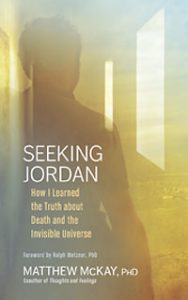
An Excerpt from Seeking Jordan by Matthew McKay, PhD
The ones who hurt Jordan go on, while his days with us slip farther and farther into the past. What was the plan, the purpose, in his leaving so early, in the middle of a passionate life?
In the beginning I tried to explain that rendezvous — between Jordan and his murderers — as chance, as a random convulsion of fate where men who are prone to violence happened to cross his path. And I have imagined them as victims too, poured from families and neighborhoods that breed trauma. I have imagined them, impoverished of other opportunities, using violence as an instrument to prove themselves or meet basic needs.
I have tried to explain violence — and the moment Jordan died — as the poet W. H. Auden did: “Those to whom evil is done / Do evil in return.” But while that statement is absolutely true — as I know from my own work with trauma victims — I less and less believe it as the reason for losing my son. That’s because the matrix of cause and effect is only the most obvious explanation for events.
If I let go of my pen, the force of gravity will make it fall. Cause and effect. If a child is raised in a brutal, treacherous environment, attachment theory predicts he or she will struggle with emotion dysregulation, as well as with aggressive or impulsive behavior. Again, this would appear to be cause and effect. However, falling pens don’t make choices. Our human ability to choose — through some degree of free will — tangles the web of cause and effect. Causes become harder to trace.
To understand why Jordan was killed I’ve had to go back to the question of why we are here. In fact, I’ve had to go even further, to the purpose of the material universe.
Jordan tells me this:
The purpose of matter — whether in the form of circling planets or the human body — is to help consciousness grow. All of physical existence serves this purpose. Consciousness creates matter and the laws of the universe. Then it manipulates and lives in physical worlds in order to learn and evolve. So every event is an opportunity for souls to grow.
There is no tragedy; there is no loss. There are just events we learn from.
We select lives based on what will probably happen in that life, and what those experiences will teach. So our lesson plan determines the body, family, and environment we enter — including major relationships, challenges, and crises. But things don’t always go according to plan, because of choices — our own and those of the souls around us. The possibilities at the moment when we select a life are often changed by the counterforce of free will.
The matrix of cause and effect, stretched over time, collides with hundreds of choices by dozens of nearby souls. As a result, what we signed up for may look very different thirty, forty, or fifty years into a particular life. To add to the uncertainty, lessons that go unlearned must be presented again in new circumstances. And karmic challenges that have finally been faced and surmounted will be dropped from the lesson plan, with new learning opportunities to replace them.
How much, I ask Jordan, of the lesson plan for a life actually happens?
The big challenges and major events usually occur. This is because the waves of probability are so strong and because they intersect from multiple sources. But events with a lower probability are often erased by decisions we make. For example, souls born in the 1920s and 1930s had an almost 100 percent probability of facing World War II. Where they lived and how the war might touch them wasn’t likely to change. But choices they made responding to countless life events could change their circumstances — even to the point of altering the likely span of their lives.
In short, the big stuff is set. But as the force of probability diminishes, our individual wills have more effect on what happens. This much is always true: whether events occur as planned or are affected by choice, the purpose of everything is to learn.
Matthew McKay, PhD, is the author of Seeking Jordan and numerous other books. He is a clinical psychologist, professor at the Wright Institute in Berkeley, CA, and founder and publisher at New Harbinger Publications. Visit him online at www.SeekingJordan.com.
Excerpted from Seeking Jordan: How I Learned the Truth about Death and the Invisible Universe. Copyright ©2016 by Matthew McKay, PhD. Reprinted with permission from New World Library.
